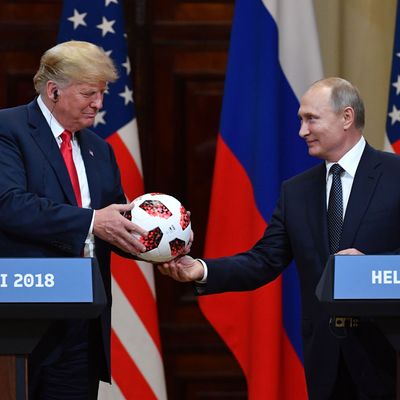
Before President Trump’s bizarre trip to Helsinki — where he met privately with Vladimir Putin, expressed confidence in the Russian dictator’s professions of innocence in the email-hacking crime for which U.S. intelligence holds him unmistakably accountable, accepted a soccer ball containing a transmitter chip, and later invited Putin to visit again soon — his party appeared to be mobilizing for war against Robert Mueller. Rod Rosenstein had pleaded with House Speaker Paul Ryan to support him against Devin Nunes’s baldfaced efforts to penetrate his investigation of Trump, to no avail. House Republicans voted in lockstep (back on June 28) to demand the Justice Department hand over still more documents to Nunes; and Ryan professed his openness to a resolution censuring Rosenstein. National Review editor Rich Lowry and Wall Street Journal columnist William McGurn, among others, called for Rosenstein to be fired or impeached.
After Helsinki, the momentum against Mueller has come to a screeching halt. The party’s turn is most visible in the stillborn efforts of House radicals to impeach Rosenstein.
Impeachment was never going to be a viable tool for Republicans to remove Rosenstein or shut down the Mueller probe. Removing a federal official through impeachment has never been done. It takes a two-thirds vote of the Senate in addition to a majority vote in the House. The point, instead, was to pressure Rosenstein and Mueller to comply with Nunes’s attempts to get inside their investigation, and to give Trump cover to fire one or both men.
Instead, the introduction of the impeachment resolution is showing that anti-Mueller fervor is receding. Advocates of impeachment could have introduced it as a “privileged” measure, which would have guaranteed a quick floor vote. They declined, which — given the upcoming House recess — will mean their plan won’t see the light of day any time soon, if at all. More ominously, Ryan publicly opposes it, making its prospects for passage highly doubtful.
The right-wing media, which has lapped up the pro-Trump narrative, has almost ignored the impeachment resolution. Breitbart and the Federalist, two organs dedicated to prosecuting Trump’s campaign against the deep-state conspiracy, gave the impeachment measure second- or third-tier space on their home pages. The Journal has not mentioned it in an editorial yet.
The party’s diminishing enthusiasm for tormenting Rosenstein, after having ramped up for months and months, is hard to explain as anything but a response to Helsinki. Trump defied his national security advisers to attend the meeting at all, and continued to grapple with both his own advisers and Republicans in Congress after. The summit reveals the degree to which Trump stands almost completely alone in his Russophilia, save for the company of Dana Rohrabacher and perhaps Rand Paul. Republicans in Congress might be okay with some light collusion to help swing an election their way. More than a few of them probably get queasy at the prospect of an actual Russian puppet in the Oval Office. Trump’s supine performance with Putin was so overtly suspicious it seems to have strained his party’s appetite to protect him from investigation.






























